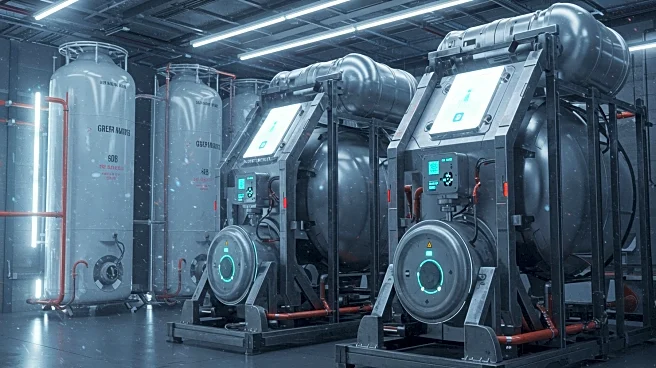What's Happening?
Tidal NRG and Innov8 Gases have announced a partnership to develop helium-based cooling systems for artificial intelligence (AI) and high-performance computing (HPC) data centers. This collaboration aims to address the thermal management challenges posed by large-scale computing operations. The agreement includes the joint development of intellectual property (IP) for next-generation cooling technologies, leveraging Innov8's helium supply capabilities and Tidal NRG's expertise in AI infrastructure. The initiative seeks to eliminate cooling-related water consumption, offering a more environmentally friendly alternative to traditional methods. Helium's thermal conductivity and inert nature are expected to enhance efficiency, reduce energy use, and extend system lifespan.
Why It's Important?
The development of helium cooling systems is significant due to the growing demand for efficient thermal management in data centers, particularly those involved in AI model training and other data-intensive processes. Traditional cooling methods, which often rely on water, have faced criticism for their environmental impact, including high water consumption. The helium-based approach could mitigate these concerns, potentially reducing power demand and environmental footprint. As the data center cooling market is projected to exceed $30 billion by 2028, innovations like helium cooling could play a crucial role in meeting regulatory requirements and public expectations for sustainable practices.
What's Next?
The partnership between Tidal NRG and Innov8 Gases is expected to lead to the deployment of helium cooling systems in AI and HPC data centers. Tidal NRG will enter into a long-term helium purchase arrangement and acquire a minority equity stake in Innov8 Gases to support future deployment. As the market for data center cooling continues to grow, the adoption of helium-based systems could influence industry standards and practices, potentially leading to wider acceptance and implementation of environmentally friendly cooling technologies.
Beyond the Headlines
The shift towards helium cooling systems highlights broader trends in the tech industry, where sustainability and efficiency are becoming increasingly important. This development could encourage other companies to explore alternative cooling methods, fostering innovation and potentially leading to new regulatory frameworks that prioritize environmental considerations. The collaboration also underscores the importance of strategic partnerships in advancing technological solutions that address complex challenges.









